Monday 16 June 2025 Alon Pertzikovitz successfully defended his doctoral thesis entitled ‘The way we move: The role of parents in geographical mobility‘ at the University of Groningen.
Parents play a key role in their children’s geographical mobility, both in childhood and adulthood. In childhood, parents shape their children’s mobility experiences by deciding when, where, and whether to move, decisions which can have lasting effects on their social, educational, and emotional development. In adulthood, as individuals gain residential independence, parents influence geographical mobility behavior, especially through support and expectations regarding proximity. This dissertation shows that the social, cultural, historical, and geographical context of this lifelong parent-child link in geographical mobility matters for both geographical experiences in childhood and geographical mobility decisions in adulthood. The research demonstrates that over past decades, childhood mobility rates have decreased across Europe, a process related to delayed parenthood. This decline in childhood mobility may seem positive given the results revealing negative long-term outcomes associated with frequent moves. However, the research highlights that this decline is largely driven by fewer children experiencing any moves throughout childhood, suggesting a growing divide between children who experience stable and unstable residential circumstances. For adult children, the research shows that in the Netherlands, geographical proximity to parents is affected by life-course events, but these dynamics differ between migrant groups. Moreover, it shows that concentration of family networks explains the lower mobility rates among children of immigrants compared to people of the majority group. Overall, the dissertation advances knowledge on the role of childhood geographical mobility in the accumulation and reproduction of life disadvantage and the role of proximity to parents in mobility decisions across different groups in society.
This research was conducted at the Netherlands Interdisciplinary Demographic Institute (NIDI-KNAW) as part of the project “Migrant youth mobility in Europe: patterns, processes and consequences (MYMOVE)”, funded by the European Research Council (ERC) under the European Union’s Horizon 2020 research and innovation programme (Grant agreement No. 819298).
For more information on the PhD defence see the University of Groningen website.

